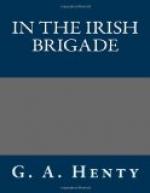“You all have horses. You can each take your soldier servant with you, but those who do so must either hire or purchase a horse for him. All further details you will learn from Colonel Wauchop, and the paymaster will have orders to issue two months’ pay to each of you, in advance. The distance will be about a hundred and fifty miles, and you will perform it in five days.”
Colonel Wauchop then addressed a few words to the officers, all of whom were under the rank of captain.
“Gentlemen,” he said, “you have an honourable task before you. For years we have been waiting for the day when our swords might aid to place our king upon the throne. At last it has come. I need not say that the struggle will be a severe one, and that your courage will be taxed to the utmost, but you have proved that in a score of desperate fights.
“The task before you will need tact to no ordinary degree. The Scotch are as peppery a race as the Irish are, and it will be necessary in no way to hurt their feelings, or to excite among them the smallest degree of discontent at being drilled and led by men who are not of their own race.
“And now, as we have much to do before starting, I will leave you to make your arrangements. The rendezvous for us all is in your barrack yard, and at nine o’clock we shall be here.”
The colonel now left the room, and the officers eagerly and excitedly talked over the startling news that they had just heard. The greater part of those who had been selected for the service were delighted to go, while the others were equally pleased, at the thought that they might shortly be fighting for King James on the soil of Ireland.
“Sure, your honour, I wish it had been in the ould country instead of Scotland,” Mike said, when he heard the news.
“I cannot say that I agree with you, Mike. In Ireland, we should find tens of thousands of brave hearts ready to join us, but they are unarmed, undrilled, and undisciplined, and would be of comparatively slight assistance to us against the English troops. Defeat would bring down fresh persecutions, fresh confiscations, and greater misery upon the land.”
“Sure we would beat them, your honour.”
“We might, Mike; but you must remember that we failed to do so, even when the people were armed. No doubt we shall take a certain amount of muskets and ammunition with us, but the power of England is more assuredly fixed in Ireland now than it was then—the influence of the old Irish families is broken, and even if we armed all who joined us, it would be but an armed rabble and not an army.
“In Scotland it is altogether different. The Scottish clans would join us under their chiefs, to whom they give absolute obedience, and they would turn out armed and ready for action. Thus, then, I think that, allowing that Ireland is as loyal as Scotland, the choice has been a wise one.”
“Sure, you know best, your honour; but I will warrant that as soon as Scotland rises, Ireland will be in a blaze from one end to the other.”




